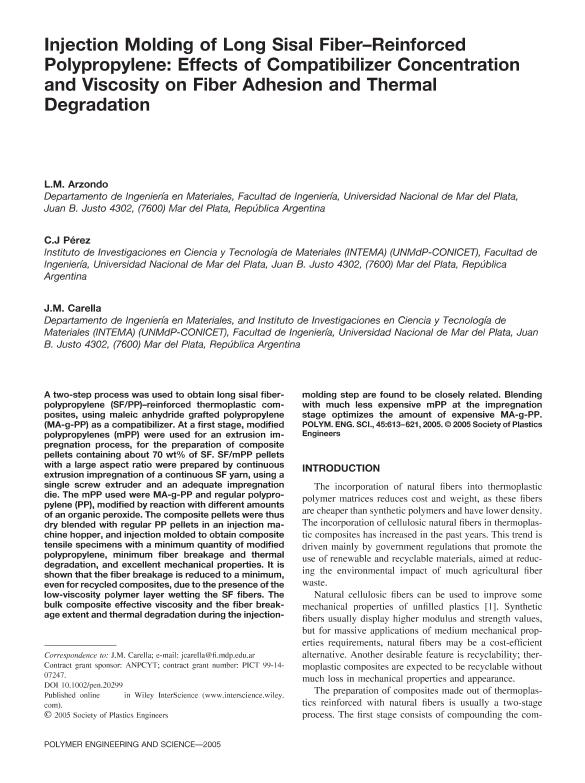Artículo
Injection molding of long sisal fiber-reinforced polypropylene: Effects of compatibilizer concentration and viscosity on fiber adhesion and thermal degradation
Fecha de publicación:
04/2005
Editorial:
John Wiley & Sons Inc
Revista:
Polymer Engineering and Science
ISSN:
0032-3888
Idioma:
Inglés
Tipo de recurso:
Artículo publicado
Clasificación temática:
Resumen
A two-step process was used to obtain long sisal fiber-polypropylene (SF/PP)-reinforced thermoplastic composites, using maleic anhydride grafted polypropylene (MA-g-PP) as a compatibilizer. At a first stage, modified polypropylenes (mPP) were used for an extrusion impregnation process, for the preparation of composite pellets containing about 70 wt% of SF. SF/mPP pellets with a large aspect ratio were prepared by continuous extrusion impregnation of a continuous SF yam, using a single screw extruder and an adequate impregnation die. The mPP used were MA-g-PP and regular polypropylene (PP), modified by reaction with different amounts of an organic peroxide. The composite pellets were thus dry blended with regular PP pellets in an injection machine hopper, and injection molded to obtain composite tensile specimens with a minimum quantity of modified polypropylene, minimum fiber breakage and thermal degradation, and excellent mechanical properties. It is shown that the fiber breakage is reduced to a minimum, even for recycled composites, due to the presence of the low-viscosity polymer layer wetting the SF fibers. The bulk composite effective viscosity and the fiber break-age extent and thermal degradation during the injection-molding step are found to be closely related. Blending with much less expensive mPP at the impregnation stage optimizes the amount of expensive MA-g-PP.
Archivos asociados
Licencia
Identificadores
Colecciones
Articulos(INTEMA)
Articulos de INST.DE INV.EN CIENCIA Y TECNOL.MATERIALES (I)
Articulos de INST.DE INV.EN CIENCIA Y TECNOL.MATERIALES (I)
Citación
Arzondo, Maria Matilde; Pérez, Claudio Javier; Carella, Jose Maria; Injection molding of long sisal fiber-reinforced polypropylene: Effects of compatibilizer concentration and viscosity on fiber adhesion and thermal degradation; John Wiley & Sons Inc; Polymer Engineering and Science; 45; 4; 4-2005; 613-621
Compartir
Altmétricas




